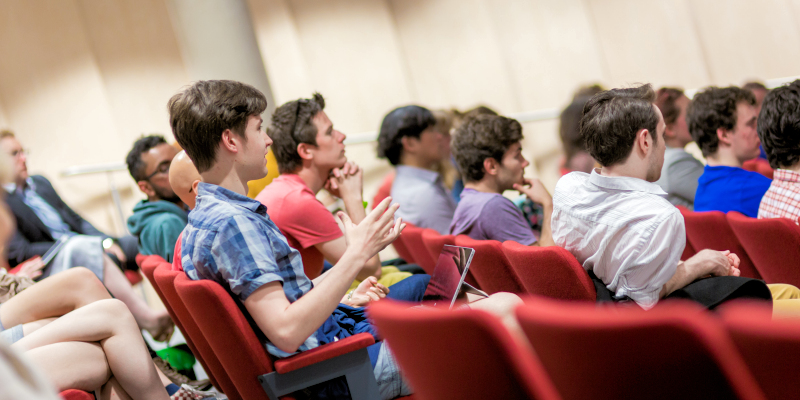
Department seminars
Upcoming seminars
There are no events to show here right now. Please check back another time.
Past events
Dr John Oyekan, Senior Lecturer in the Department of Computer Science will be presenting this seminar.
Join Professor Eleni Vasilaki as she discusses the reinforcement learning method.
Wearable and mobile devices are very good proxies for human behaviour. Yet, making the inference from the raw sensor data to individuals’ behaviour remains difficult. Here Professor Cecilia Mascolo reflect on the challenges and opportunities.
Professor Philip Koopman joins us to discuss autonomous vehicle deployment governance.
Join us on Campus East for this engaging seminar on animal behaviour
Hosted by Simon Forster with guest speaker Professor Chung-Kil Hur
Robot design is traditionally the domain of humans – engineers, physicists, and increasingly AI experts. Evolutionary computing is a well-known technology that has been applied in various aspects of robotics for many years, for example to design controllers or body-plans.
Alex "Sandy" Pentland, Toshiba Professor at MIT and one of the most-cited computational scientists in the world and entrepreneur, will be delivering the 2021 Sabine Krolak-Schwerdt lecture.
Find out about The National Nuclear User Facility for Hot Robotics.
Active ingredients from medicines can get into the environment through a variety of routes, and once there they can prove harmful to wildlife and ecosystems. In the EU, new medicines are required to undergo an environmental risk assessment (ERA). However, so far just a handful of the 1900 or so active pharmaceutical ingredients (APIs) in use have been assessed.
The emerging contemporary natural philosophy provides a common ground for the integrative view of the natural, the artificial, and the human-social knowledge and practices.
Presentations from Professor Dr. A.E. Eiben on evolving real robots for engineering and research, and Kennedy Edeye on the use of Robotics in the management and conservation of the Pemba Channel seafloor, Tanzania
James Borg, Lecturer in Evolutionary Systems at Keele University, argues that our models of environmental variability should exhibit characteristics of 'coloured noise', especially when exploring artificial evolutionary dynamics.
Dr Annette Zimmermann will develop three arguments for why scrutinizing available decision landscapes matters in our pursuit of algorithmic fairness.
Three lightning talks will give an insight into ongoing projects within YCCSA.
Hear Dr Jenn Chubb and Dr Sondess Missaoui map a way in which to consider the social context within technology development substantiated and supported by argumentation from within literature.
Delaram Kahrobaei reveals how the speed and power of quantum computing could soon break the codes that protect our most sensitive data.
Paul Cairns explores the diverse cognitive experiences of playing games.
Themis Prodromakis will present the challenges in manufacturing and using new AI technologies and examples on how these can be used in practical applications: from bio-electronic medicines to 'AI on a chip' solutions.
Burcu Can will present her work.
The massive scale of social media platforms requires an automatic solution for detecting hate speech.
Digital twins powered by IIOT and industrial AI: a co-creation between data scientists and engineers
The technology and operation of assets are complex, but the adoption of IIoT in and its use with IT/OT platforms enables the use of ‘digital twins’ to manage, monitor and maintain assets in a totally different way.
The World Health Organization acknowledged that “The 2019-nCoV outbreak and response has been accompanied by a massive ‘infodemic’ … that makes it hard for people to find trustworthy sources and reliable guidance when they need it”. We will discuss the tools developed at QCRI to provide support towards addressing this problem and information manipulation in general in the context of social media and traditional media outlets.
Professor Amin Shokrollahi introduces a new modulation scheme for chip-to-chip communication known as 'chordal codes'.
Software is in the very fabric of the systems we utilise in our daily lives - from online banking to social media through to critical infrastructures that bring water and electricity to our homes and drive systems such as transportation, health and governmental services.
The Federated Learning One World (FLOW) seminar provides a global online forum for the dissemination of latest scientific research results in all aspects of federated learning, including distributed optimization, learning algorithms, privacy, cryptography, personalization, communication compression, and new generation models.
Bayesian networks (BNs) represent patterns of conditional independence between random variables and sometimes also represent causal relations.
This talk will describe a series of recent advances in parallel real-time systems research, including both theoretical and practical results.
This talk will discuss a genetic algorithm-based approach to derive a perceptually accurate mapping between the parameter spaces of parametric Bidirectional Reflectance Distribution Functions.
This talk will give a complete survey on hyper-bent Boolean functions and present very recent results.
Delaram Kahrobaei presents her research on Cryptography, Quantum Computation, Artificial Intelligence and Applied Algebra.
Georgios Giantamidis presents his research on formal methods workflows.
